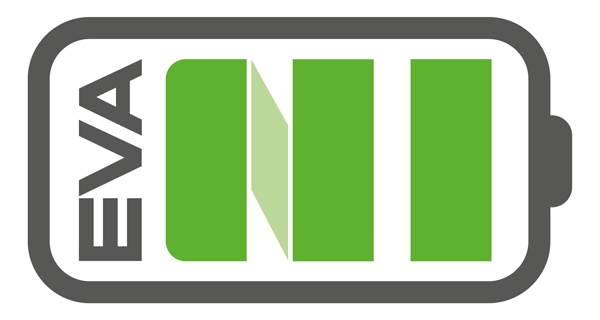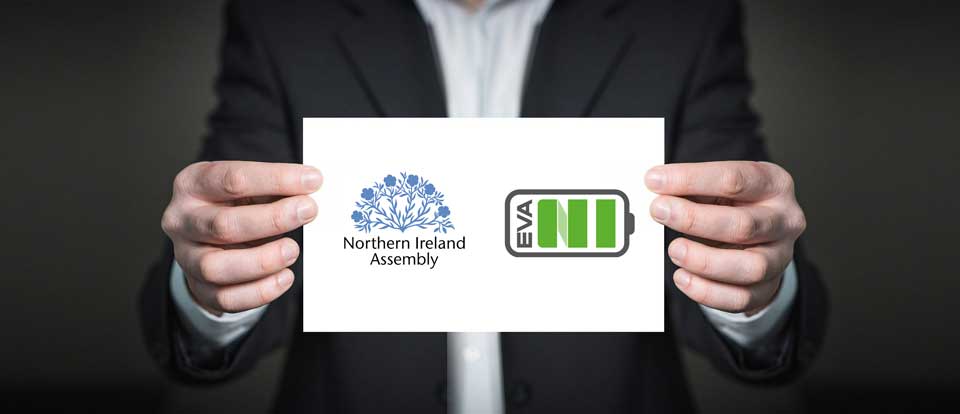Back in March the Committee for Infrastructure launched their enquiry and survey into decarbonising road transport in Northern Ireland.
As part of that initiative, EVANI representatives were invited to give a presentation to the Committee earlier today. Due to COVID restrictions we met virtually, via video link to Stormont.
You can watch our presentation in its entirety below, from around 16:48 (the full text of our presentation is also copied below and on Hansard). This is followed by a Q&A session with Committee MLAs, as well as responses from Liz Loughran, DfI’s Director of Transport Policy.
We wish to thank the Committee for the opportunity to present today. We appreciate the invitation and their continued interest in the issues surrounding electric vehicle use in Northern Ireland.
[UPDATE – This was featured in a Live Interview on BBC Newsline and on the BBC News Website.]
Background
Our group was formed in 2016 and earlier this year transitioned to the EV Association Northern Ireland, a not-for-profit community interest company. Our 2 main aims are to represent the interests of electric vehicle users in Northern Ireland and also to promote EV use here.
The Issues
I’m sure the committee members will be aware that there’s a single overriding issue facing EV drivers here, and that is the size and condition of our public charging network.
Rolled out from 2011, much of this hardware has reached the end of its useful life and our snapshot in February showed that more than a quarter of AC chargers and around half of DC chargers here, are out of order.
Seeing blocked and broken chargers is a disincentive to anyone considering changing to an EV, but it’s much worse if you already drive one. I’d like to read you just a few of the comments we’ve received from EV drivers over the last few months….
“My lease deal is up in November. Seriously considering going back to diesel and yes its because of how terrible the charging infrastructure is in Northern Ireland. There are now less chargers than when I got my car 2 years ago”
“As it’s so bad here both my father and myself have reverted back to diesel cars. You cannot rely on the charging network here, it’s appalling”
“We have really enjoyed having a Leaf. Unfortunately we have to go back to diesel due to the unreliability of the network”
“For a business looking to bring EVs into our fleet how do we do it when the infrastructure isn’t supporting it. Vans would not be able to return to base if they cannot charge”
So then, not only is the current network stopping some people converting to an EV, including businesses, it’s also forcing some drivers back to fossil fuel. In fact our recent survey showed that 58% have considered a return to petrol or diesel, directly due to issues with the public charging network here.
Solutions.
So, what can be done?
We published a 6 Step Plan in February this year which identified matched funding from DfI to ESB as the fastest, most effective way of getting things back on track here. ESB tell us that it is currently difficult for them to identify a business case for the rollout of replacement chargers here and that they need matched funding to complete the work. Importantly this will allow them to finally turn on “Pay to Charge” and with that comes the ability to free up chargers by penalising drivers who abuse the current free service, using overstay fees. This has proved successful in the South where it’s been in operation for 18 months now.
The Interreg FASTER project promises more than 20 new Rapid Chargers across Northern Ireland and we certainly welcome this investment. However it is still 2 years away and we believe these units may be limited to just 50kW. This was the standard 10 years ago, but we’d like to see 100 kW chargers here at a minimum. As battery sizes have grown we also need to make sure charging speeds increase too.
A recent Ulster University study by Dr Patrick Keatley showed that In 2020 we dumped 465 GWh of renewable wind energy here. That has a retail value of almost £80M and in EV terms represent around 1.6 Billion miles of carbon free driving or, to put it in a local context, more than 11 million return journeys from Belfast to Derry/Londonderry.
So we also need to make changes to our electricity network that will provide the consumer-side flexibility we require. While new technology allows certain advances behind the meter, NIE Networks tell us the rollout of Smart Meters here is needed to facilitate this transition.
This in turn will require Decarbonisation to become part of our Utility Regulator’s remit. This change will help promote innovation, remove barriers to competition and allow tariff reform. We expect many of these issues can be solved within the new DfE Energy Strategy which DfI are involved with. Although once again it looks like this work may take years rather than months.
We know that DfI are currently helping local councils too, as they prepare to apply for part of the £20M ORCS grant. We would like to see the department take a much more active role here, leading our 11 councils, and fast tracking the removal of any barriers to make it as easy as possible for them to add on-street charging quickly.
It’s important to point out that even if ESB replaced 100% of the network tomorrow, that would really only take us back to where we were ten years ago. So the final step of our 6 point plan is to ensure funding is available for future growth.
As we expand the network we need to ensure that we fill in the gaps in the map for CCS Charging, and that all new sites will have 24/7 access, unlike many of our public chargers which are currently locked up at night. We need Service Level Agreements for guaranteed uptimes and we should remove the requirements for special cards or apps, always having the option for contactless payments and generally making charging as frictionless as possible. It should be an offence to block a charging space and we need enforceable penalties to discourage offenders. There should be 2 green spaces painted at every AC charger to maximise the infrastructure we already have, and signage also needs to be improved as does accessibility for blue badge holders.
With less expensive running and maintenance costs, EVs generally have a lower total cost of ownership than fossil fuel cars. However, the initial outlay is still too high as we are several years away from costs reaching parity with internal combustion cars.
To help with this issue, Transport Scotland funds an interest free loan of up to £28,000 for a new EV, up to £10,000 on a new electric motorbike and up to £6,000 for eBikes, with re-payment terms of up to 5 years. With governments able to borrow at historically low rates, we would like to see the executive consider a similar initiative for Northern Ireland.
And for drivers buying the most affordable 2nd hand EVs, public charging is particularly important. These cars have the smallest batteries and are most reliant on charging on the go. Also, between 30% and 40% of dwellings in Northern Ireland do not have off street parking, and hence no way to charge at home. We all want to see a green recovery and also one that is fair and inclusive.
The department often quotes this line in its correspondence – “sustainable modes of transport including public transport, walking and cycling”. We would like to see “electric vehicles” added here in future and for the department to be seen to be promoting the change to EVs.
According to DfI’s own Travel Survey 71% of all journeys here are by car, covering 83% of total distances. We encourage active travel and public transport for all is a great goal, although clearly one that remains many years away here. 1 in 3 people in Northern Ireland live rurally and that is increasing. We firmly believe in the importance of balance and choice. The car is a lifeline that brings personal freedoms that, for many, are simply not possible by any other means of transport.
We need new legislation to set out obligations for providing minimum levels of charging in new commercial and domestic developments. For example, current plans for one Translink car park shows 350 spaces, with just 2 designated for EV charging. That’s just 0.6% of spaces.
In addition we need charging solutions for our Taxi drivers, for charging at our airports, our train stations and our park and rides. We need to encourage EV tourism and provide a network which makes it easy for visitors to travel to the North in their zero emission vehicles.
Summing Up
To sum up then, while Electric Vehicles are not a panacea, they are part of the solution. An EV is only ever as clean as the source of its electricity, but we are already at 49% renewable energy here, and with targets to increase that to at least 70% by 2030, every EV will become even cleaner over time, decarbonising transport and bringing air quality benefits to our towns and cities.
2020 figures for new plugin vehicle sales in Northern Ireland show a 290% increase over 2019. So last year we registered almost as many new EVs here as in the 7 year period from 2011 to 2017. This transition is accelerating and we need policy and actions to keep pace.
We’re around 8 and a half years away from the 2030 ban on purely fossil fuelled cars, in fact by September this year we’ll be just 100 months from that deadline. 100 months to expand the infrastructure, that cannot cope with the 4,700 EVs we have here today, into a public charging network to support something more like 400,000 EVs, according to NIE Network’s model.
We all know the issues and we have the answers. We would very much like to see DfI given the resources to lead this transition, setting up an EV Taskforce, working in partnership with stakeholders, to create policy and targets with measurable outcomes, and importantly, with funding for future growth.
Committee – it’s time to be ambitious and to drive this change forward. Thank you.


No responses yet